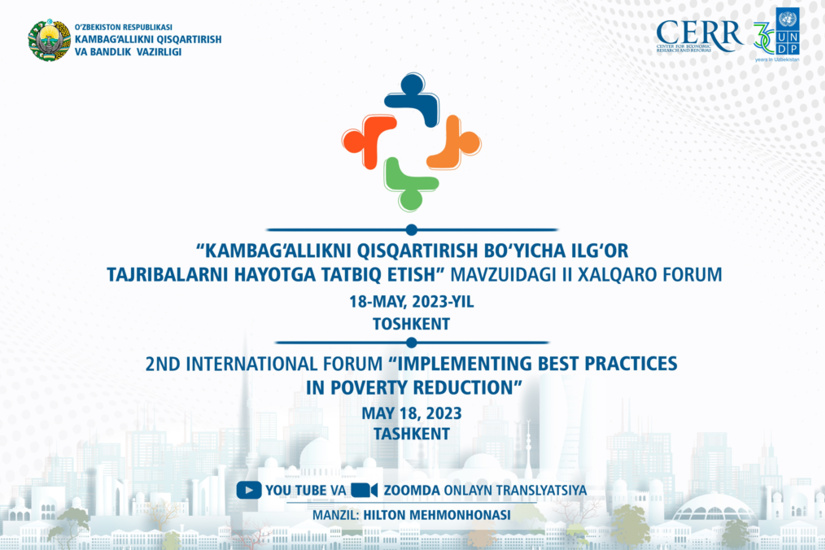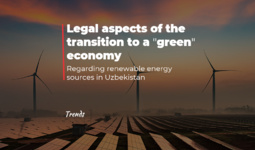On May 18, 2023, the Hilton Tashkent City Hotel will host the 2nd International Forum “Implementing Best Practices in Poverty Reduction”.
This year, the Forum is organized by the Center for Economic Research and Reforms (CERR) together with the Ministry of Employment and Poverty Reduction of the Republic of Uzbekistan. The Forum is organized with the support of the United Nations Development Programme in Uzbekistan and the United Nations Children’s Fund.
About 200 delegates are expected to take part in the 2nd International Forum on Poverty Reduction, which will be held in our country, including experts from the global initiative to combat poverty J-PAL, UN, UNDP, ILO, World Bank, UNICEF, ADB, AFD, GIZ, GGGI, etc.
Of great importance will be the participation of Abhijit Banerjee, Alfred Nobel Prize winner, co-founder of the global initiative to combat poverty J-PAL as well as James Foster, Professor of Economics at George Washington University, who studies the economics of welfare and the measurement of poverty and Sabina Alkire, director of the Oxford Poverty and Human Development Initiative.
The Forum will be attended by Vice-President of the Asian Development Bank Shixin Chen, Vice-President of the World Bank for Europe and Central Asia Anna Bjerde, UN Resident Coordinator in Uzbekistan Consuelo Vidal Brus, Head of the UNICEF Office in Uzbekistan Munir Mammadzade, Head of the World Bank in Uzbekistan Marco Mantovanelli, Director-General of the International Poverty Reduction Center in China Liu Junwen, Vice Director of the National Rural Revitalization Administration of China Jiang Tianbao.
In addition, representatives of the Republic of Azerbaijan, the Republic of Kazakhstan, the People's Republic of China, the Kyrgyz Republic, the Islamic Republic of Pakistan, the Republic of Tajikistan, as well as the diplomatic corps are expected to participate.
The purpose of the 2nd International Forum will be to study the world's best practices and methods of poverty reduction, to form priority areas for future joint research in the coming years with a special emphasis on an integrated and comprehensive approach to resolving multidimensional poverty, social protection and targeting, improving the quality of training programmes in the labor market through the development of human capital, supporting the growth of small enterprises, expanding access to a high-quality education.
The participants will review the methods and results of Uzbekistan's achievements in the implementation of measures to combat poverty, including their effectiveness, in order to further expansion of the acquired experience in developing countries.
Within the framework of the Forum, it is planned to sign a number of cooperation documents and adopt a joint Communique, including the signing of a joint Action Programme between the Center for Economic Research and Reforms and the J-PAL.
Uzbekistan's experience in poverty reduction
If most countries are fighting poverty on the basis of ready-made practices and strategies based on the recommendations of international organizations and accumulated experience, in Uzbekistan an original organizational model of poverty reduction has been formed in a short time, which was introduced last year and today shows positive results.
A special place in the social policy of Uzbekistan is occupied by the solution of the problem of poverty, the active fight against which began in 2020, when our country officially recognized the fact of poverty. Databases of socially vulnerable groups of the population were formed for the purpose of targeted support. Since 2021, a mechanism for accounting of the poor has been introduced by listing them in the “Unified Register of Social Protection” system. This led to the fact that if in 2017, 500 thousand low-income families received social assistance, at present it is more than 2.2 million. The volume of allocated funds has increased sevenfold and reached 13 trillion sums ($1.1 billion) per year.
As noted in the President's Address to the Oliy Majlis and the people of Uzbekistan on December 20 last year, the goal was set to build a New Uzbekistan based on the principle of a “social state”, to provide people with equal opportunities to realize their potential, to create the necessary conditions for a decent life for citizens and poverty reduction.
Based on this, the task has been set to increase state spending on the social sphere. Therefore, in 2018 it amounted to 35 trillion sums, in 2019 – 61.3, in 2020 – 74.2, in 2021 – 85.3. In 2022, 105.5 trillion sums have already been allocated.
At a video conference chaired by the President of the Republic of Uzbekistan Shavkat Mirziyoyev, which took place on January 25 this year and was devoted to the issues of poverty reduction and employment of the population, the data provided showed that the processes of poverty reduction in Uzbekistan are effective and demonstrate high efficiency.
In particular, it was noted that the poverty rate by the end of 2022 decreased from 17 to 14 percent. Special attention was paid to new jobs. In a year, about 200 thousand economic entities were created, the activities of 10 thousand were expanded and the production capacity of 11 thousand enterprises was restored. Due to the implementation of state programmes, including in the field of vocational training of people, assistance to entrepreneurship in makhallas, 1 million people have been brought out of poverty.
The Presidential Decree “On measures to implement administrative reforms of the New Uzbekistan” dated December 21, 2022 is of great importance for further improving the effectiveness of poverty reduction measures. Five departments responsible for poverty reduction have been transformed into a single system of the Ministry of Employment and Poverty Reduction of the Republic of Uzbekistan, which has been provided with all organizational capabilities and financial resources. The concentration of issues of a mutually intersecting nature within one ministry will undoubtedly contribute to their more effective and comprehensive solution.
The fight against poverty, as one of the central points of the global agenda of the last decade, has been consistently implemented in state policy in Uzbekistan. As our country enters the phase of the “second generation of economic reforms”, the policy continues to fulfill the agenda dedicated to the fight against poverty and inequality.
The Address of the Head of state outlines the priorities of the policy to reduce poverty in 2023.
In particular, measures will continue to be taken to improve living conditions and overcome poverty at the makhalla level. It is planned to allocate almost three times more funds, almost 8 trillion sums, for the implementation of projects initiated by the population.
A mechanism has been laid to ensure the reduction of economic inequalities between regions, which, based on their conditions and potential, are divided into five categories. Based on a specific category, it is planned to allocate subsidies, loans and compensations to entrepreneurs. Tax rates will also be differentiated.
The mortgage programme of social housing “My first house” is starting in the Tashkent region (housing construction is provided primarily for needy families). The volume of housing construction will increase by 1.5 times and reach 90 thousand apartments and individual residential buildings.
The task has been set to carefully develop and approve employment programmes for 2023 in the context of districts.
It is planned to develop a single digital passport for each low-income family, prepare individual programmes to get out of poverty, implement vocational training and entrepreneurship projects. For these purposes, the creation of 300 microcenters has been started in makhallas. It was instructed to develop a programme for the reinforcing entrepreneurship in each district.
This year, 12 trillion sums will be allocated for the family business programme. The maximum size of such loans will increase. According to the Presidential Decree “On additional measures to support family entrepreneurship development programmes” dated January 25, 2023, funds in the amount of $300 million at a rate of 10 percent for a period of 7 years will be allocated to finance projects within the framework of family entrepreneurship development programmes by Agrobank, Mikrokreditbank and Xalq Bank with a 3-year grace period.
Public Relations Service of the CERR
tel.: (+998) 78 150-32-20 (417)





















leave a comment